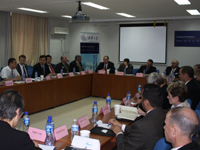Registration
You will receive an email confirming your registration.
IMGXYZ2557IMGZYXChina’s evolving foreign policy continues to dominate discussions of Sino-U.S. relations. Yet there has been relatively limited in-depth analysis of Chinese public opinion and its impact on China’s foreign policy. The Carnegie-Tsinghua Center for Global Policy and Tsinghua University's Center for U.S.-China Relations co-hosted a meeting betweenTsinghua scholars and a U.S. military delegation from Capstone, a group that provides joint service professional military education courses for newly promoted brigadier generals and rear admirals serving in the U.S. military. The event was moderated by Carnegie’s Paul Haenle.
China’s Foreign Policy
Dr. Sun Zhe, Director of Tsinghua University’s Center for U.S.-China Relations, described China’s foreign policy as guided by three principles: Harmonious development ; A peaceful rise in global influence; Support for a harmonious world.
- China’s diverse positive and negative trends: Sun stressed the variety of viewpoints among citizens born since the 1979 Open Door Reforms and the country’s more than 400 million Internet users. In the face of such diversity, “Beijing acrobatics” have become integral to maintaining the flexibility necessary to confront a nation struggling with rapid growth, sustainability issues, environmental degradation, corruption, and minority integration.
- Crises and the importance of communication: While noting an overall positive trajectory for Sino-U.S. relations, Sun acknowledged the tendency of some groups within each country to view the other nation as the enemy. He also cited the potential for incidents such as the 2001 EP-3 incident, 1999 U.S. bombing of the Chinese Embassy in Belgrade, and ongoing U.S. arms sales to Taiwan to derail Sino-U.S. interaction. Haenle observed that during these crises channels of communication between the United States and China should be most open, but instead they have tended to close. A more concerted effort by each government should be made to create more robust channels of communication.
- Strategic trust: One of the U.S. experts in attendance suggested that, since the 1980s, Sino-U.S. ties have been severed several times for reasons that were not always tied to China’s core interests. Sun responded that there continues to be an overall lack of political and strategic trust between Chinese and U.S. leaders. He cited U.S. pursuit of the X-37 orbital test vehicle and non-nuclear prompt-global strike capabilities as among the issues exacerbating threat perceptions between the countries. Sun stated that severing of military exchanges, in fact, offers an arena in which the Chinese government can exert leverage , mitigate domestic criticism of government weakness, and express dissatisfaction with U.S. policies that violate China’s core interests on Taiwan, Tibet, and Xinjiang.
China’s Global Rise
Dr. Sun Xuefeng, Assistant Director of Tsinghua University’s Department of International Relations, outlined three challenges resulting from China’s rise.
- Economic strength: Rather than prioritizing its military power, Sun suggested that China is focused on economic development and involvement in global financial institutions. Still, he stressed that China faces the issue of translating its military capabilities into the ability to protect its overseas economic interests.
- International isolation: Sun commented that none of the other major emerging economies – Brazil, Russia, and India – can currently match China’s rate of development. China eschews strategic allies and faces concerns among its neighbors over its growth, leaving it even more isolated.
- Domestic vulnerability: Sun suggested that China faces the dilemma of how to meet its international responsibilities and concurrently sustain its domestic growth. Chinese experts in attendance acknowledged that China faced serious threats from income gaps, environmental degradation, and corruption. Haenle pointed to the daunting scale of domestic job creation demands on Chinese leadership, while Chinese participants emphasized the negative impact of U.S. punitive sanctions on China’s small business owners.
Chinese Public Opinion
Dr. Zhang Chuanjie, Assistant Professor within Tsinghua University’s Department of International Relations, discussed his research on public opinion and how these views impact foreign policy.
- A diversified view of the United States: While traditional characterizations of the United States as a “symbol of wealth and power” consistently appeared in Zhang’s surveys, he noted a growing number of participants who described the United States as “arrogant” or a “world cop.” Despite these negative characterizations , the overall expansion of viewpoints on the United States is a positive one, Zhang argued. He stressed that opinions among China’s citizens are not monolithic, but rather a multifaceted and shifting force.
- Public opinion lags behind policy realities: Zhang stressed that while overall Sino-U.S. relations and cooperation improved following the events on September 11, 2001, public sentiment lagged behind. It was not until 2006, according to Zhang’s research, that Chinese public opinion “crossed the barrier” and shifted towards becoming more positive.
- Foreign policy as a bottom-up issue: One of the U.S. attendees questioned the degree to which the Chinese government is responsive to the views of its domestic audience. Zhang pointed out that over fifty percent of the Chinese survey respondents brought up Taiwan in the context of Sino-U.S. relations. In his view, this indicates that there exists more domestic pressure on the issue of Taiwan than is often acknowledged. Zhang emphasized that public opinion from the “bottom-up” exerts an influence on the Chinese government that should not be ignored.
